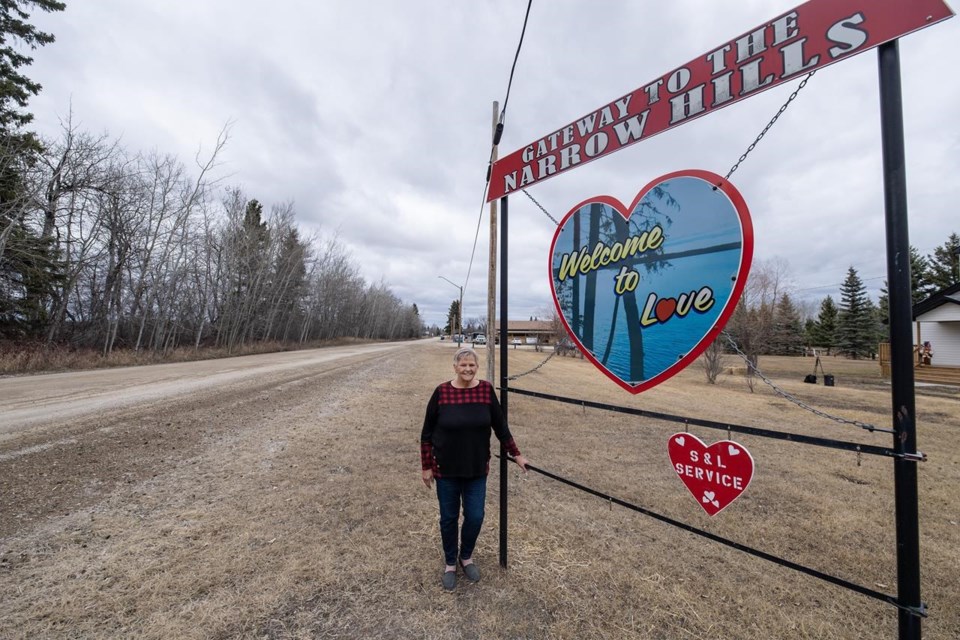LOVE, SASK. — A small Saskatchewan village is looking to put Love on the map by becoming a unique wedding destination.
“Everybody should be in Love at least once in their lives,” Marvin Torwalt, who is known as the resident Love historian, says with a big smile.
The Village of Love is fully embracing its name with a new wedding chapel. It will give couples the chance to share their love in Love.
The village, northeast of Saskatoon with a population of 72, had for years received letters and requests of lively lovers looking to tie the knot. The ideas for Love spread and streets were renamed to things like Lover’s Lane, Valentine Avenue and Hearts Delight Street.
People from all over travelled to the community after Cupid's strike but there was nowhere official to exchange their vows.
So, Mayor Shelley Vallier says a few years ago they decided to take things a step further and fully promote the passion in their namesake.
“I want to turn the village into one that looks like a village of love,” Vallier says.
Through a lot of hard work, donations, fundraising and the generosity of current and former residents, that vision is becoming a reality.
While Love is looking to the future, it is intrinsically connected to the area's rich past.
The chapel building was an old Canadian Pacific Railway bunkhouse from nearby Choiceland that was donated. It was gutted and refinished. In the steeple is a donated Canadian National Railway bell.
The benches, which can seat 50 people, were purchased from a church in Prince Albert, west of the village.
Vallier says the project cost more than $65,000 but the promotion of love in Love is worth every penny. One wedding has already taken place and another is scheduled for May.
But Love wasn’t always focused on its name, says Torwalt.
The village had its genesis in the early 1930s as families searched for reprieve from the effects of the Great Depression farther south. Sawmills sprang up, bringing along homesteads and households eager for opportunity and affordable land.
The population would eventually peak at around 250 people, with two general stores, a hotel, pool bar, gas stations, insurance office and a couple of cafés.
The local lore has two origins of the village’s name. A young woman was employed in the kitchen at a mill and fell head over heels for one of the workers. A railroad employee spotted the couple and called the community Love Siding.
“They must have been the talk of the town that they were sweet on each other,” Vallier says with a laugh.
The other story, more likely to be true, is that when the railroad station was established, the first train conductor to come through was Tom Love.
Documents show the community was called Love Siding in the 1930s but officially became Love when it was incorporated in 1945.
As the lumbering industry in the area started to decline, people moved elsewhere and businesses closed for many decades.
But the love for Love always remained.
People with family connections to the area still help the village, whether it's to build the chapel or hold annual festivals in the campground.
The population has even started to increase in recent years and children once again run along the quiet streets.
“This is one of the only towns I know of that’s maintaining or growing a little bit,” Torwalt says.
“That takes dedication.”
Even with love as the core value, there are challenges in the way. The village recently learned it needs to replace the roof of its local hall at a cost of around $100,000. Plans for a honeymoon suite, stone walkway and other romantic spots are put on hold until they can arrange those funds.
While there are some hurdles, the village will still go above and beyond to celebrate love.
In the local post office, Connie Black excitedly pulls out letters she’s received from people who want a special Love stamp on their wedding invites, Valentine cards or notes to that special someone. A map of the world hangs on the wall, with stickers marking places they’ve received letters from.
It’s a huge honour, she says, to play a little part in so many love stories.
“It’s so cool.”
This report by The Canadian Press was first published April 14, 2024.
Kelly Geraldine Malone, The Canadian Press




